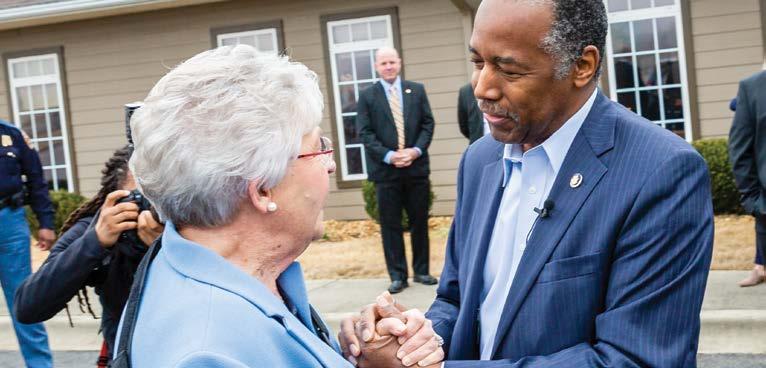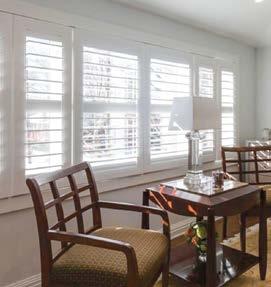
5 minute read
HUD Uses Affordable Housing Bus Tour to Announce Major Changes
By Patrick Revere
Alabama Gov. Kay Ivey greets HUD Secretary Ben Carson during the "Driving Affordable Housing Across America" bus tour on its stop in Russellville, Ala. Photos courtesy of Clayton.
The U.S. Department of Housing and Urban Development Secretary Ben Carson took to the road in late January and February to tour home building facilities, and to talk with locals who need access to better affordable housing.
HUD’s “Driving Affordable Housing Across America” is a multi-city bus tour that will run through the spring of 2020. In addition to touring the facility, Secretary Carson took questions during an employee town hall.
The bus tour kicked off in Louisville, Ky., made a stop in Nashville, Tenn., and toured a Clayton Homes factory,
talking with manufactured housing industry professionals in Russellville, Ala.
“This first leg is through the great American south, and the real focus of the travel has been to meet with local government officials and looking at how we can work together to reduce a lot of the regulatory barriers that are driving up the cost of housing,” Carson said to an audience of hundreds in Russellville. “I was delighted to be here this morning and to be able to look at the incredible development that’s been going on with manufactured housing.
“A lot of people… they have no idea what’s happening in this industry,” he said.
The Progress Being Made in Affordable Housing
Manufactured Housing Institute CEO Lesli Gooch joined the Clayton Homes and HUD teams for the tour.
“We’re honored that Secretary Carson and the HUD team chose a manufactured housing facility for one of the first stops on the tour,” Gooch said. “It’s an excellent example of the department’s commitment to elevating manufactured housing’s role in affordable housing.”
Among the many changes in direction and policy to arise from HUD in recent years, the bus tour announcements have particular appeal to the manufactured housing industry. “Policies that exclude manufactured housing development prevent affordable alternatives to traditional stick-built housing, and that’s not a good thing,” Carson said.
For more than two years, MHI has been providing policy insight and suggestions for the Manufactured Housing Consensus Committee, and much of that new language is now under review and up for consideration in a revised HUD code.
“When finalized, these proposed changes will be the first major updates to the standards in over a decade,” Carson said. “These changes will reduce regulatory burdens for manufacturers while maintaining high levels of quality and safety for the consumer.”
Carson pointed to four key improvements to the code: 1. Eliminates the need for manufacturers to obtain alternative construction approvals from HUD when they install certain modern design features not covered in the current building code, including garages and carports.
2. Includes requirements for carbon monoxide detectors that will increase health and safety while eliminating the need for manufacturers to comply with state-based requirements.
3. Implements standards that allow for more optimal use of manufactured housing in urban areas, including opportunity zones.
4. Updates reference standards that will increase design flexibility, and aligns federal standards with industry practices. “I think these things will help to accelerate the use of manufactured housing across the nation,” Carson said.
Another change proposed by HUD covers regulatory requirements for the use of materials that contain formaldehyde.
“This final rule eliminates overlap in the regulation of wood products that contain formaldehyde so that manufacturers don’t have to comply with multiple regulations that all try to get to the same goal,” Carson said. “It also eliminates the regulatory burden on manufacturers of providing a formaldehyde notice creating a more level playing field with stick-built housing.”
Secretary Carson, left, gets a tour of Clayton’s Russellville plant. Clayton CEO Kevin Clayton is seated at center.

The Affordable Housing Crisis
Kevin Clayton, the CEO for Clayton, introduced Secretary Carson for his talk in Russellville. His words echo what many industry professionals have been thinking about the reinvigorated enthusiasm for factory-built housing.
“He is the hardest working secretary we have ever seen,” Clayton said of Carson. “And he has absolutely made manufactured housing a centerpiece of his housing strategy across America. He’s spoke very highly of this industry for »

MAVERICK COMMERCIAL MORTGAGE, INC. 2019 CLOSINGS
Byrnes Mill Farms – House Spring, Missouri Manufactured Housing Community $10,250,000
Shadeland Estate – Shadeland, Iniana Manufactured Housing Community $2,685,398
Oklahoma, Texas & Florida Portfolio Lakeside Estates – Umatilla, Florida Manufactured Housing Community Portfolio $18,279,350
MHC Financing Professionals: “We start closing from the first conversation.”
2019–2020 MHC Closings: $156,634,317
his entire term serving as secretary, and we are so very grateful for that.” And Carson was just as complimentary of the hard work industry professionals have initiated.
“I was immediately in awe of the hard work that’s being done here, and it really all goes to make the American Dream a reality for so many people,” Carson said.
He noted that in many U.S. markets the average home price is approaching or exceeding $300,000.
“What young couple can afford that?” he asked
“And yet we look at the model you guys built here in two weeks, and it’s absolutely gorgeous, beautiful. And you know it provides an opportunity for that young couple to be able to afford something that builds equity for them,” he said. “And, they don’t need to live in their grandmother’s basement.”
Manufactured housing makes up about 10% of annual housing starts each year, and is home to more than 22 million Americans.
“It’s a big part of housing,” Carson said of the industry. “Manufactured housing also plays an important part in the wider economy, employing in excess of 40,00 people, and when you look at suppliers to manufactured housing you really get into hundreds of thousands of people.”
Keeping the manufactured housing construction code up to date is critical for ensuring the industry can efficiently produce homes with innovative features and amenities consumers want.
“We want to clear the path for you to help our own communities reach their highest potential,” Carson said in closing. “When we put politics aside and work together to do what’s right we can deliver truly life-changing results for the people.” MHV










